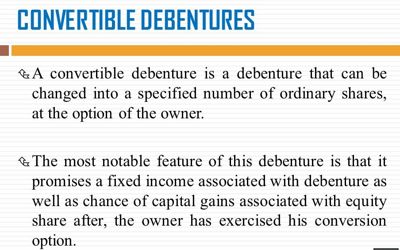A convertible debenture is a type of long-term debt issued by a company that can be converted into shares of equity stock after a specified period. In these debentures, an option is given to the Debentures holders to exchange a part or whole of their Debentures for shares in the Company under certain conditions and limitation imposed regarding the period during which the option may be exercised this enables investors to change the position from the Debentures holder to a Shareholders. Convertible debentures are usually unsecured bonds or loans, often with no underlying collateral backing up the debt.
A convertible debenture is a type of unsecured long-term convertible debt issued by a company, meaning that it contains a stock conversion option.
The Convertible Debentures are a type of loan that can be converted into the stock of the company after a stipulated time period at the option of the holder or the issuer in special circumstances. It is a type of hybrid security with characteristics of both debt and equity instruments. Essentially, convertible bonds are corporate bonds that can be converted by the holder into the common stock of the issuing company. Companies issue convertible debentures as fixed-rate loans, paying the bondholder fixed interest payments on a regular schedule.

The most popular benefits of convertible debentures for investors are as follows –
- Investors receive a fixed-rate and also have the option to partake in stock price appraisal.
- In case an issuer’s stock price declines, investors are entitled to hold onto the bonds until maturity.
- Convertible debenture holders are paid before other stockholders in the event of liquidation of the company.
Convertible bonds are corporate bonds that can be exchanged for common stock in the issuing company. Typically, a convertible debenture is issued by a company and can be converted into equity shares eventually. Companies issue convertible bonds to lower the coupon rate on debt and to delay dilution. Notably, the decision to convert debentures into equity shares lay with shareholders, and they are treated as the creditor or lender.
The most noteworthy drawbacks of convertible debentures as investment options include –
- When compared to traditional bonds, convertible debenture holders accrue a lower interest rate.
- Debenture holders may be subject to the risk of company default. In such a situation, the company will be unable to repay even the principal amount to investors.
- In case the stock prices decline after the conversion of debentures into equity, investors could lose their invested money.
Companies can force conversion of the bonds if the stock price is higher than if the bond were to be redeemed. Generally, businesses issue such long-term debt instruments to avail tax-saving benefits. For instance, companies that issue convertible debentures are entitled to claim tax deductions on the amount of interest paid to investors.
Information Source:
















